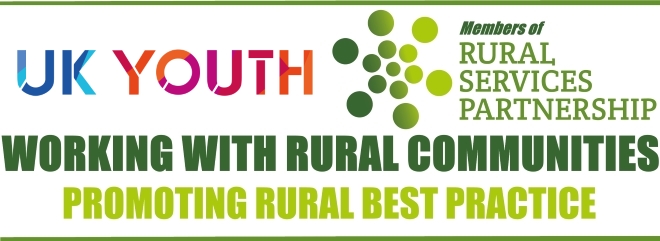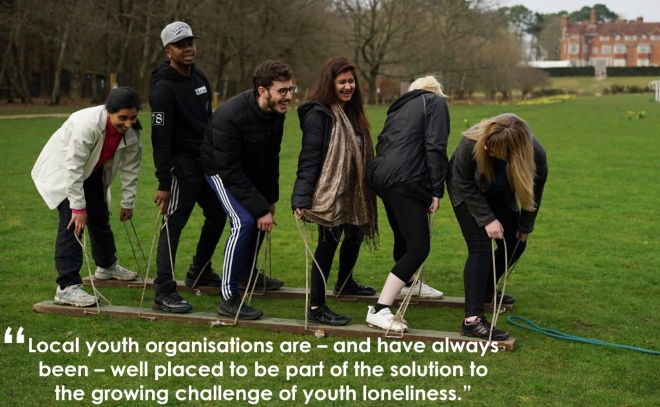T: 01822 851370 E: [email protected]
Visit RSN Survey about life in rural England to find out more.
82% of youth workers believe loneliness is a problem for young people


This article is taking from the UK Youth website and can be found here
- A new report published today suggests that youth loneliness is a ‘common experience’ that could affect all young people
- Young people seem to face barriers when talking about feeling lonely with 73% of youth workers disagreeing that they actively seek help
- The report advises that local youth organisations are ideally placed to be a key part of the solution but a clear strategy to tackle youth loneliness is necessary to eradicate the issue
New research published today by national charity, UK Youth, suggests that youth loneliness is a ‘common experience’ and could affect all young people with 82% of youth workers agreeing that loneliness is an issue for the young people they work with.
UK Youth’s report, ‘A Place To Belong’, which was funded by the Co-op Foundation – the UK’s leading funder of projects tackling youth loneliness – collated quantitative and qualitative data from youth workers across UK to explore the role of local youth organisations in addressing youth loneliness, focusing on the perspective of youth workers.
The research found that despite youth loneliness being widespread, young people seem to face barriers when talking about feeling lonely with 73% of youth workers disagreeing that the young people they work with actively seek help to tackle the problem.
To help better identify lonely young people, youth workers acknowledged four key risk factors that could lead to youth loneliness. These include going through a significant or difficult situation; weak social networks; high expectations of social networks; and having a limited ability to cope with difficult situations (e.g. low confidence or resilience).
The research also suggested that local youth organisations are ideally placed to be a key part of the solution. 67% of youth workers reported their youth organisation currently offers support for young people who feel lonely. This support includes providing safe spaces for young people, fostering a sense of belonging and providing opportunities to build positive relationships, gain skills to respond to difficulty and access specialist support.
Phil Sital-Singh, Head of Impact and Learning at UK Youth said: “Youth loneliness is one of the biggest issues facing young people across the country. Local youth organisations are – and have always been – well placed to be part of the solution. Our report found that youth workers have a wealth of experience, which helps to build a sense of belonging and social networks in a safe space where they are supported by a trusted adult. However, more needs to be done to support youth workers to be as effective as they can be. Our report sets out clear recommendations to continue and improve youth workers’ support to young people. If the recommendations in this report are taken forward, local youth organisations could make a substantial positive difference in the fight against youth loneliness.”
The new report recommends a number of practical steps – both at strategic and delivery level – to support the youth sector to more effectively address youth loneliness1. Youth workers call for a clear strategy to tackle youth loneliness, supported with a simple definition of the term; more collaborative working between local services; and a commitment from the government and other major stakeholders to sustained funding and further research to better understand what preventative, restorative and responsive interventions work best for young people.
Jim Cooke, Head of the Co-op Foundation, said: “Youth organisations are an important line of defence in tackling loneliness, but this research shows they face challenges that affect their ability to support young people as effectively as they would like to. We call on other funders, sector leaders and policy-makers to join us in responding to the insights and recommendations from A Place to Belong. By working together, we can unlock the full potential of local youth services to help all young people find a sense of belonging.”
Read the full findings from ‘A Place To Belong’ here.
1Recommendations to support youth organisations to more effectively address youth loneliness
From the themes discussed in the report, a number of practical steps are suggested by youth workers to support local youth organisations in addressing youth loneliness.
At a strategic level, we recommend:
- Support for further research and consultation with the youth workers, young people and experts to develop a youth sector-wide strategy for youth loneliness;
- A commitment from government and other major stakeholders to fund the involvement of young people in the co-design of specific solutions and resources to ensure they are realistic and fit for purpose;
- An increase in core funding to enable existing local youth organisations to provide support to young people at risk of loneliness;
- An increase in funding for detached work to allow youth organisations to better engage those young people who can’t access, or aren’t accessing youth centres.
At a delivery level, we recommend:
- Development of tools and resources to help youth workers raise awareness of loneliness, appropriately and effectively among all young people;
- Development of activities and resources to help youth workers identify young people at risk of loneliness, and young people to identify themselves and their peers as at risk and in need of support;
- Development of activities and funded programmes that build resilience and strong support networks – two key protective factors in reducing the risk of loneliness;
- Development of an organisational ‘diagnostic’ to allow local youth organisations to self-assess and improve their ability and capacity to address youth loneliness;
- Develop an appropriate measurement framework and indicators to enable organisations to identify, support and demonstrate success in supporting young people into positive relationships and belonging;
- Development of better links between local youth organisations and local educational, health and social services to both ‘refer-in’ and ‘refer-out’ young people to provide better holistic support
For more information, please contact:
UK Youth - [email protected]



